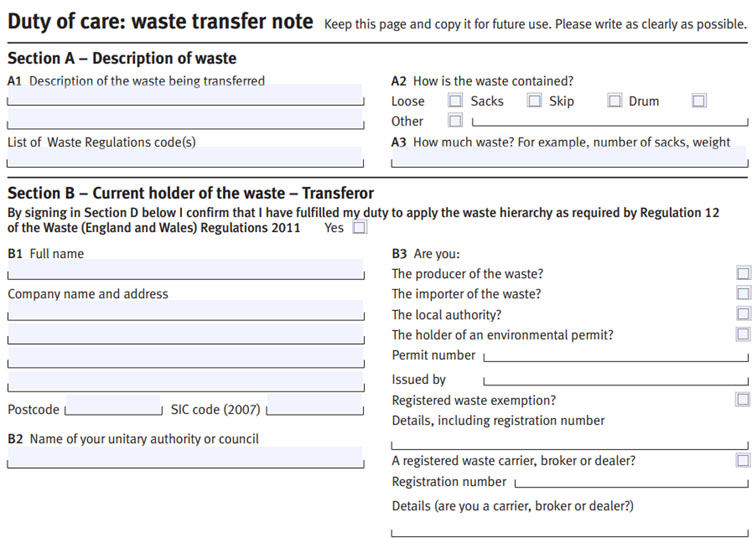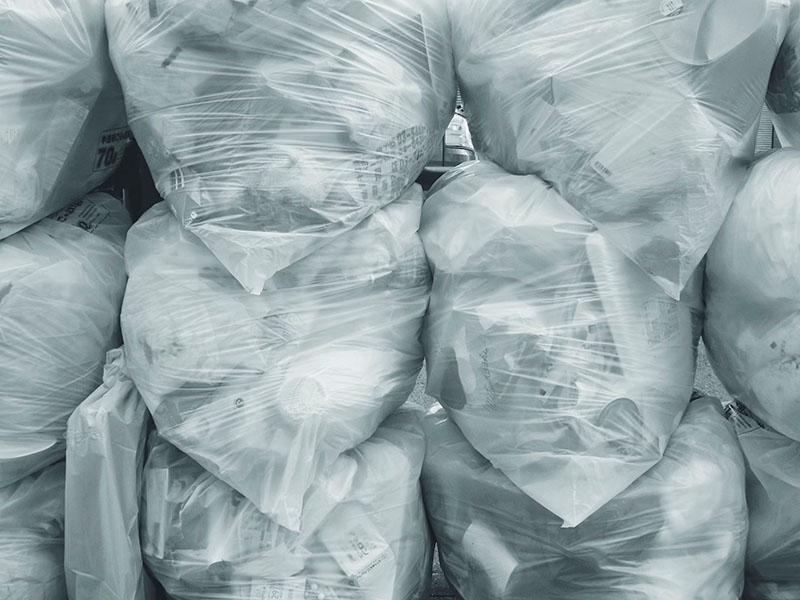What is a Waste Transfer Note

A waste transfer note is a vital document that tells the government where your waste is and who’s handling it. This helps to ensure that your business waste is being handled properly, responsibly and in an eco-friendly way.
It’s also a very important piece of paperwork to keep you and your company safe from legal action. If your waste leaves your jurisdiction without one, you’re still responsible for it! Improperly managed rubbish can have a drastic effect on the environment and can result in heavy fines.
Waste Transfer Notes

Example sections of a waste transfer note (https://www.gov.uk/government/publications/duty-of-care-waste-transfer-note-template)
A waste transfer note needs to detail who you are, which company the waste is being transferred to and what type of rubbish is involved. This helps to keep track of where the waste is and what effect it could have if improperly handled.
A single waste transfer note should be filled in every time you hand off your rubbish to another company. If you’re partnering with a waste management company and you want your notes to cover several different transactions, you should fill in an annual waste transfer note.
Annual Waste Transfer Notes
Annual waste transfer notes require you to dispose of waste in a similar way every time, but they can be used to cover waste transactions for up to a year. While this can save you the time of filling in a transfer note every fortnight, you still need to keep a record of each individual transfer - don’t forget to do this, as you’ll need to provide these records in the event of an issue.
Hazardous Waste Consignment Notes
Hazardous waste cannot be transferred under a waste transfer note. You must fill in a separate document called a hazardous waste consignment note in order to dispose of hazardous waste such as bodily fluids, chemicals, and gas canisters.
A consignment note is a much more detailed document that requires the waste to be trackable at every turn - if this waste ends up fly-tipped, it can have a catastrophic effect on the environment.
What are Waste Transfer Notes Used For?
Waste transfer notes are used to protect both your business and the environment from illegal actions like fly tipping. Proper waste management is incredibly important to protect the environment and is enforceable by the government, especially when dangerous waste such as paint and electronics is involved.
If you don’t have a waste transfer note and your waste is fly-tipped, your company could face a hefty fine and legal action. You have a duty of care when it comes to waste, and waste transfer notes are your responsibility to make sure that it doesn’t end up illegally or irresponsibly disposed of. If you keep your waste transfer notes properly, legal action will fall on the waste removal company and not you - but that doesn’t mean that you should let it happen, either!
What is Fly Tipping?

Fly-tipping is the illegal disposal of waste in the environment. This could be in public spaces like parks and woodland, or on private land such as farms and fields. Fly tipping is inexcusable and can have catastrophic effects on the ecosystem. From birds using synthetic fibres for nest building to oil and paint leaking into running water, wildlife can suffer serious consequences from the act.
Fly tipping is a crime punishable by law, and hiring rogue tradespeople who dispose of rubbish in this way can have long-term effects on your business.
How to Tell if a Waste Disposal Company is Legitimate
A legitimate waste management company will be listed on the public register. Both the company name and registration number should be readily available to look up online.
Once you’ve found a registered company, get in contact and ask them where they dispose of their waste - you should receive the name of a disposal site (or several) which you can then confirm through further checks. Make sure that you keep a record of these sites and conversations, just in case.
Once you’ve arranged for your waste to be collected, you should make sure that your transaction has a paper trail. No cash - invoicing is the only acceptable method if you need to defend yourself in future. To find out more, visit the environmental agency’s recommendation page for waste management checks.
To reduce your carbon footprint, you should also endeavour to hire eco-friendly and carbon-neutral waste disposal companies. Check out their sustainability documents to ensure that your waste will be disposed of responsibly and recycled where possible.
Which Companies Need to Use Waste Transfer Notes?
All companies disposing of rubbish need to use waste transfer notes. Don’t assume that small amounts of waste don’t need to be monitored - issues can arise no matter how much waste you’ve handed off to someone else. If the waste is produced by your company, you must keep a record of its movements.
How Long Do You Need to Keep a Waste Transfer Note?
You should keep a record of the waste transfer for a minimum of two years after the transaction. This can be a paper or digital copy, but you should ensure that you can always produce it if asked. Make sure to back up important records just in case, whether they’re physical or digital copies.
What are the UK’s Waste Transfer Note Requirements?
In your waste transfer note, you will need to provide the name and address of both companies (yours and the recipient) and the licence of the transferee, as well as a description of the waste.
For hazardous waste, the requirements are much more extensive: the destination of the waste must be outlined alongside a detailed description, the carrier’s certificate details and a full overview of each type of waste being transferred.
Check out our blog for more info about waste management and how you can help to reduce your carbon footprint while safely disposing of rubbish.

